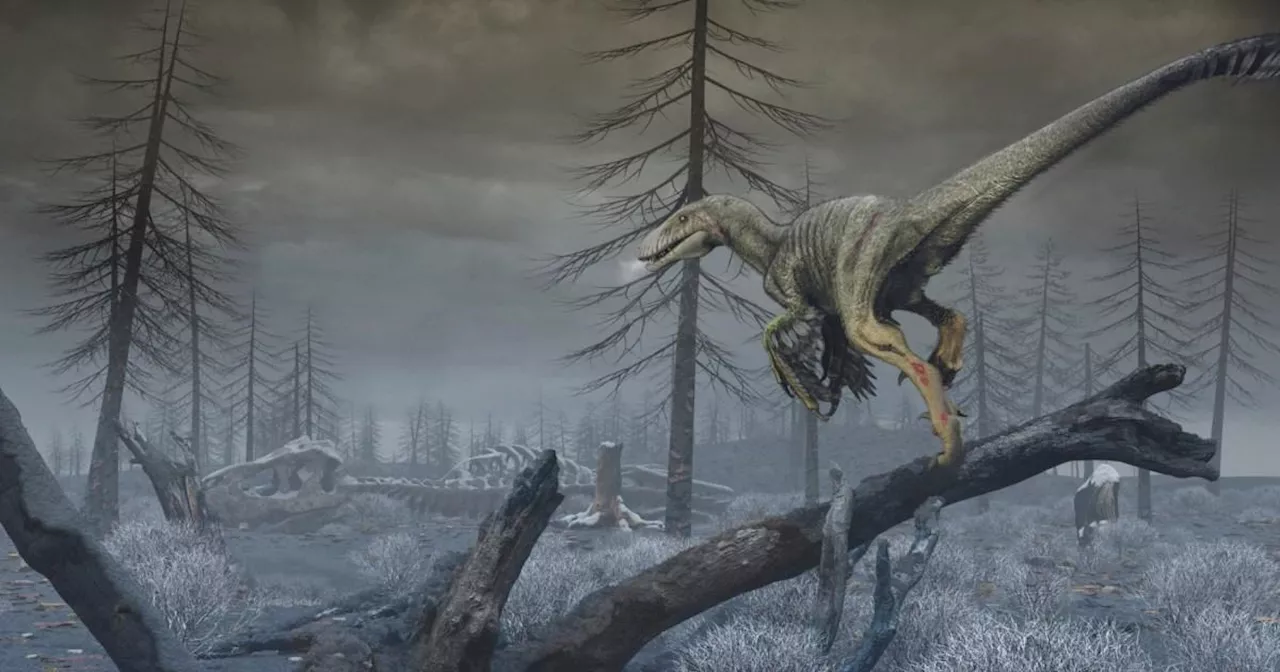It's everywhere, actually.
Dust from the Chicxulub asteroid crash plunged the Earth into an ‘impact winter’, leading to the extinction of the dinosaurs, a new study says It was, to put it mildly, a bad day on Earth when an asteroid smacked Mexico’s Yucatan Peninsula 66 million years ago. The impact caused a global calamity that erased three-quarters of the world’s species – and ended the age of dinosaurs. The immediate effects included wildfires, quakes, a massive shockwave in the air and huge standing waves in the seas.
‘It was cold and dark for years,’ said co-author Dr Philippe Claeys, a Vrije Universiteit Brussel planetary scientist. Earth descended into an ‘impact winter’, with global temperatures plummeting and primary productivity – the process land and aquatic plants and other organisms use to make food from inorganic sources – collapsing, causing a chain reaction of extinctions. As plants died, herbivores starved. Carnivores were left without prey and perished.
United Kingdom Latest News, United Kingdom Headlines
Similar News:You can also read news stories similar to this one that we have collected from other news sources.
 Scientists Predict Drastic Changes in Flood Frequency in North EastScientists warn that climate change will lead to more frequent and extreme floods, with the North East of the country expected to experience the most significant changes. Recent water scarcity warnings in Scotland during the summer have also increased the risk of wildfires.
Scientists Predict Drastic Changes in Flood Frequency in North EastScientists warn that climate change will lead to more frequent and extreme floods, with the North East of the country expected to experience the most significant changes. Recent water scarcity warnings in Scotland during the summer have also increased the risk of wildfires.
Read more »
 Scientists Discover DNA Elements Linked to AgeingHungarian scientists have found elements in our DNA that can destabilise genetic codes and cause ageing. However, they have also discovered a way to control these elements, which has increased the lifespan of worms in experiments. The research team hopes that this breakthrough will lead to a better understanding of DNA and potential ways to extend human lifespans.
Scientists Discover DNA Elements Linked to AgeingHungarian scientists have found elements in our DNA that can destabilise genetic codes and cause ageing. However, they have also discovered a way to control these elements, which has increased the lifespan of worms in experiments. The research team hopes that this breakthrough will lead to a better understanding of DNA and potential ways to extend human lifespans.
Read more »
 Scientists isolate 'pre-emerging' bat coronavirus but also identify existing medication that potently neutralizes itRepeated outbreaks of bat-derived coronaviruses among humans and other mammals have heightened the need for a broad range of therapeutics—monoclonal antibodies and antivirals—treatments that can come immediately 'off-the-shelf' to address newly-emerging zoonotic threats.
Scientists isolate 'pre-emerging' bat coronavirus but also identify existing medication that potently neutralizes itRepeated outbreaks of bat-derived coronaviruses among humans and other mammals have heightened the need for a broad range of therapeutics—monoclonal antibodies and antivirals—treatments that can come immediately 'off-the-shelf' to address newly-emerging zoonotic threats.
Read more »
 Remote sample management unchains scientists from their lab benchUsing high-speed, web-based communications protocols - DP5 Network rack decoding software from Ziath can be run from a laptop, desktop, phone, or any other network connected device.
Remote sample management unchains scientists from their lab benchUsing high-speed, web-based communications protocols - DP5 Network rack decoding software from Ziath can be run from a laptop, desktop, phone, or any other network connected device.
Read more »
 Scientists create special 'telomouse' with human-like telomeresIn an exciting scientific breakthrough, a team of researchers led by Professor Yehuda Tzfati from the Institute of Life Science at the Hebrew University and Professor Klaus Kaestner from the University of Pennsylvania Perelman School of Medicine, has introduced the 'Telomouse.
Scientists create special 'telomouse' with human-like telomeresIn an exciting scientific breakthrough, a team of researchers led by Professor Yehuda Tzfati from the Institute of Life Science at the Hebrew University and Professor Klaus Kaestner from the University of Pennsylvania Perelman School of Medicine, has introduced the 'Telomouse.
Read more »
